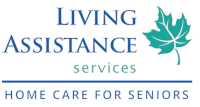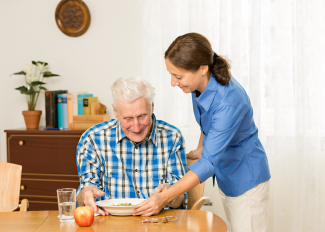Being a family caregiver often involves preparing and serving food to older family members—something that requires increasing levels of care and effort as our loved ones age. It’s not uncommon for seniors to struggle with eating or drinking, particularly if they’re dealing with cognitive or neuromuscular conditions that lead to challenges.
Our caregivers are well-trained in understanding and avoiding choking hazards in seniors, but it’s helpful for family caregivers to have this information as well. Here are some basic guidelines to help—if you’re noticing more serious feeding issues, please speak to your loved one’s medical team immediately. As the saying goes: better safe than sorry!
Understand choking hazards
If your aging loved one is having issues with feeding and/or swallowing certain food and liquids, speak to their doctor. In the meantime, here are a few higher risk foods to avoid:
- Rice
- Raisins
- Popcorn
- Steak and other meats that require significant chewing
- Hot dogs
- Grapes (ok if cut in half lengthwise)
- Peanut butter (ok when spread thinly)
- Hard candies
If your loved one is having issues with water, tea and other thin liquids, ask your doctor about thickening powder and other simple solutions. This may help your loved ones enjoy their favourite beverages safely.
Be aware of potential drug interactions
Certain prescription drugs have known food interactions—most notably grapefruit, which can be dangerous when ingested while taking statin medications like Lipitor (a common treatment for high cholesterol). Other medications cannot be taken with dairy while some must be ingested with a full (or empty!) stomach. Finally, some medications and supplements are best taken with a full glass of water (psyllium fibre, for example). It’s a lot to keep track of, we know! Read all of your loved one’s prescription medication information in detail and/or speak to their pharmacist for guidance. Drug interactions can be quite serious, but they’re easy to avoid when you’re well informed.
Consider nutrition as well as taste
While this point is particularly important if your aging loved one has a medical issue that’s directly connected to their dietary intake—for example, diabetes or high cholesterol—it’s good for all seniors to consider their nutritional intake. We recommend offering a healthy variety of protein, vitamins and healthy fats. The Mediterranean diet is often recommended for older individuals, and a registered dietitian or nutritionist (ideally one who deals primarily with seniors) can offer personalized advice. If your aging loved one is diabetic, speak to their doctor about foods to encourage and avoid!
Out with the old!
Seniors are notorious for holding on to expired food, but this can create a genuine safety issue with regard to food poisoning. Not only is food poisoning unpleasant, it can be very dangerous for seniors as vomiting and diarrhea can lead to dehydration and other complications. To minimize this risk, help your aging loved ones clean out their fridge and cupboards on a regular basis. It’s also best to ensure that their food storage methods are safe—for example, that the fridge is at the appropriate temperature, cans are stored in a cool dry place (not a hot garage), meats are being stored safely and dry goods are in clean, airtight containers. This is a case of prevention being worth its weight in gold!
Thanks as always for reading—we hope you found this information helpful. If you’re interested in learning more about in-home caregiver services in the Toronto area, please contact us. We’d be pleased to answer your questions and provide a personalized quote.

